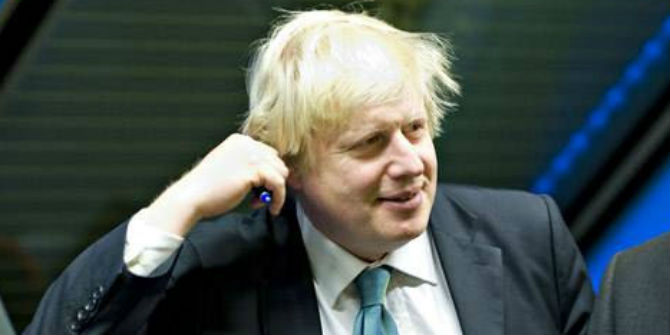Brexit has not gone away, but the world’s attention is on the Covid-19 pandemic. Kevin Featherstone, Tony Travers, Roch Dunin-Wąsowicz and Ros Taylor (LSE) explain how our coverage will change.
The LSE’s Brexit 2020 blog, in common with other aspects of life, will have to adapt to both the short and long-term impact of the coronavirus on government, politics, economics and much else. Formally, the UK government is still committed to the existing timetable for the Brexit transition period, which is currently planned to conclude at the end of this year. In reality, there are so many uncertainties affecting government and politics it is impossible to be certain if the Brexit process will finally be completed by 31 December 2020.
We will continue with our work and publish the blog, though, for the time being, with slightly fewer articles than hitherto. We will include regular updates about the Brexit negotiation process, covering the meetings that have taken place, what has been discussed and what decisions have been made. At present, all 27 EU countries and the UK are involved in unilateral, national, actions designed to reduce the immediate impact of the virus. It is possible that in the medium term some form of co-ordinated action will emerge. We will include contributions from experts analysing such initiatives, and assess their longer-term impact on the UK/EU relationship.

LSE Brexit 2020 will therefore become, in part, a response to the coronavirus crisis. The kind of issues we will expect to cover in the coming weeks include:
Emergency constraints on the democratic process
The UK and the EU will be conducting Brexit negotiations (assuming these continue) against a backdrop of reduced capacity for parliamentary oversight. Local elections have been postponed within the UK, Parliament has closed early for Easter and it seems likely other short-term changes will be made to the normal processes of democracy. Media scrutiny is also likely to be reduced. Changes to the operation of Parliament, government, the European Commission and other institutions will significantly affect the Brexit process.
The burden on governments of dealing with two complex issues in parallel
The UK government, those of the EU27 and the European Commission are likely to be operating in ‘emergency’ mode for some time to come. Focussing on the detail of Brexit negotiations and their consequences for the future of the UK and the EU27 against the backdrop of a worsening crisis will, at least for a while, make it difficult for negotiators and government departments fully to concentrate on issues such as fisheries policy, trade deals and migration rules. Only when the pandemic has been controlled will it be possible to return to normal. The timescale for achieving control is currently impossible to predict.
Possible longer-term effects on trade, trade policy and co-operation
Coronavirus has rapidly led to a suspension of elements of EU competition policy, to nationally-focused restrictions on some exports and to an immediate debate about industrial self-sufficiency. Of course, short-term concerns may abate once the immediate crisis has passed. But others may endure – notably, perhaps, a concern with border controls to ensure appropriate health and safety standards. The experience of coronavirus will likely impact on the agenda of the Brexit negotiations, and interpreting this will be important.
Potential changes in public attitudes to industrial policy, research funding and taxation
It seems almost inevitable that the response to the coronavirus crisis will include a debate about the need (or otherwise) for more national ‘champion’ companies, additional funding for medical research and the near inevitability of a requirement to raise taxes and/or cut public expenditure. Indeed, the policy approaches adopted to cope with the sudden and massive increase in public indebtedness may potentially frame economic progress for a generation. Attitudes to the state and regulation are likely to change. EU and UK responses to such issues could profoundly affect the Brexit negotiations.
Changing cultural and societal responses insofar as they affect the EU/UK relationship
In much the same way that the 2008 financial crisis seemingly took more than a decade to affect the public mood in ways that affected elections, policy and trade, the 2020 coronavirus event will inevitably change public attitudes towards government, the power of the state, business and public services. Such cultural and societal sensitivities will again feed through to political parties and electoral outcomes. The way they do so will affect the Brexit process and longer-term attitudes to the EU and national sovereignty.
Impacts on multilateral cooperation
The immediate governmental response to the coronavirus crisis has been remarkably nation state-oriented: there has been little coordinated, multilateral, action. This fact may reinforce an ‘everyone for themselves’ approach or, alternatively, convince governments they need to work together more effectively. Either outcome is important for the EU/UK relationship.
Impacts on economic and fiscal policy affecting the Eurozone
As during the 2008 financial crisis, the recent need to deliver an ECB response to a series of national economic impacts has proved challenging. The future governance of the Eurozone will also affect the Brexit process and longer-term EU/UK relations.
We plan that all of these subjects and more will be addressed by LSE Brexit 2020 during the coming months. As usual, we invite high-quality contributions on this agenda that will provoke lively debate and impact on current thinking. This is in the best tradition of LSE.
This post represents the views of the authors and not those of the Brexit blog, nor LSE. Image licensed under the Creative Commons Attribution-Share Alike 3.0 Unported license.







As I drive along the M20 in Kent, I often get stuck behind lorries importing mushrooms from Eastern Europe. Why are we importing mushrooms rather than adopting the greener solution of growing them here? The lorries have stopped. Maybe they won’t start again. One lesson from the current situation is that we need more resilient food chains and supplier chains. Ironically, we are probably already a little more resilient because of the preparations for a Hard Brexit.
Its funny how the EU finds it hard to discuss a trade deal with the UK by conference call during this outbreak but still has time for accession discussions via conference call with Albania and Macedonia.
I agree with the above comment, the UK needs to rebalance its economy and move away from such a reliance on banking and services.
The longer term response to the Covid-19 situation could go one of two ways:
1. The modelling generated scenarios play out as predicted and the reputations of the ‘experts’ survive intact; draconian, by British standards, policies prove justified and state interventions, ‘big state’, sails on.
2. The more laissez faire approach of Sweden, in contrast to its neighbour, Denmark, circumstances almost identical, clearly underline a British ‘statist’ overreaction derived from modelling outcomes based on insufficient and largely inaccurate data sets.
The government has hedged its bets, covered its backside, and, either way, now not only has a mandate for reform but a ready made excuse/motive, political cover, for just about whatever reforms it sees fit.
The NHS had a bad influenza scare as recently as 2017/18 but yet is not in anything like as good a shape as the healthcare system in Germany to cope with Covid-19.
The civil service has not covered itself in glory, deriving policy advice from similar sources to those used for the foot and mouth crisis described in the aftermath report to the eu:
‘The UK experience provides a salutary warning of how models can be abused in the interest of scientific opportunism’
Kitching R.P. (2002). – Submission to the Temporary European Union Commission on foot-and-mouth disease.European Parliament, Brussels, 16 Jul
Defence, particularly procurement, is in a complete muddle and a complete change of culture via a Government owned Contractor operated entity is badly needed. If a GoCo system works there, it could very easily be rolled out elsewhere in a public sector grown bloated from too handsome stipends alongside a ever continuing and dreary lack of success/competence.
And so on and so forth………….Britain could be in for a rollercoaster ride………
“The NHS had a bad influenza scare as recently as 2017/18 but yet is not in anything like as good a shape as the healthcare system in Germany to cope with Covid-19.”
This is a made up fact.
https://www.weforum.org/agenda/2020/02/these-are-the-countries-best-prepared-for-health-emergencies/
In October 2019, the UK was ranked 2nd in the world, Germany was ranked 14th.
Don’t take my word for it; maybe you will listen to Tim Cook, a doctor working in an NHS intensive care unit (ICU):
‘Germany has approximately four times as many ICU beds per capita as the UK and the USA perhaps 10-fold as many. Data from 2017 suggest little change. Most UK ICUs therefore run at or above 90% occupancy and often can only admit new patients only by discharging others – even when workload is normal.’
https://www.theguardian.com/commentisfree/2020/mar/03/icu-doctor-nhs-coronavirus-pandemic-hospitals
Covid 19 (Robert Koch Institute) country mortality rates:
US, 1.8 per cent (2,191 deaths in 124,686 confirmed cases), Italy 10.8 per cent, Spain 8.2 per cent, Germany 0.8 per cent, France 6.1 per cent, UK 6.0 per cent.
Covid 19: when statistics meet the real world.
‘“There does, however, seem to have been a significant gap between recognition of the risk and planning, and action on preparedness,” Catherine Rhodes, Head, Centre for the Study of Existential Risk, Cambridge University
https://www.parliament.uk/business/committees/committees-a-z/joint-select/national-security-strategy/inquiries/parliament-2017/biosecurity-human-health-inquiry-17-19/
We generally measure health services by outcomes.
So: ‘But the bad news is that, compared to some other countries, the UK’s survival rates are still lower. The UK ranks lowest of the 7 countries for 5 of the 7 cancers measured.’
The NHS, in return for massively increased funding after Covid 19, will have to accept swingeing reforms, particularly as to how that funding is provided.